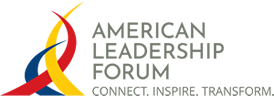
Relationships in the Age of AI
By Suzanne St. John-Crane, ALF National
On a recent Friday afternoon, I made the hour-long drive from San Jose to downtown San Francisco to speak to a group of university students at a Fintech conference. Mind you, I have very little to say about Fintech. I do however have a few things to say about relationship building and leadership, which Menlo College’s Dr. Faten Ben Bouheni hoped I would share with these finance majors.
I had a copy of A Guide to Human Citizenship: The ALF Way in tow, planning on referencing a few of the tenets for exceptional living outlined in the book, including leading with love… even in the cut-throat venture capital and start-up worlds.
I and my co-panelist were booked during the deadly post-lunch hour, staring at a room full of full and somewhat sleepy, albeit sharply dressed, future financiers. Our student moderator cheerfully alternated questions between us, my co-panelist focusing on giving practical advice from her experience as a founder, and I taking a different tact, of naming the moment we were in and the opportunity before this next generation of humans.
The well-prepared student moderator asked me, “Suzanne, change in finance and in leadership isn’t slowing down anytime soon. When leaders are reluctant to adapt, what does it take for them to overcome that resistance and guide their organizations with confidence?”
“Start by looking in the mirror. Are you the right leader in this moment?” My somewhat emboldened answer woke a few students up. I suggested s/he answer some critical questions about themselves. Am I still the right leader, at the right place? Am I living into my truest purpose? Am I on the path to having the impact I’d hoped to have in the world? I suggested that leading starts with honest, deep reflection. Not finger pointing or bending others to your will. Develop a strong knowing. Leading through change requires vision, trust and authenticity.
When talking about the importance of relationships in leadership, I named some hard truths – that we’re in the middle of a loneliness crisis and a school shooting epidemic that their generation knows first-hand. We are not knowing and taking care of each other. I saw heads nodding, and one young man sitting alone in the back finally looking up from his phone and looking me in the eye. That artificial intelligence is an incredible tool whose value, destructive consequences or societal benefits will all be determined by how humans use it, and whether or not those in power choose to appropriately regulate it.
I dove into a personal story, of how my now 21 year-old daughter and I recently had a conversation about her early social media interactions and the impact it had on her mental health. She pointed out that my husband and I were the first generation of parents trying to manage social media use and its impact on kids. It was the wild west. What she learned and experienced through unregulated, profit-driven social media taught her things she never should have seen, causing her serious harm. Her story is very typical of that age group. I came to believe that tools are not necessarily the problem. The real issue is our motivation behind creating the tool.
Over a decade ago, Institute for the Future Senior Fellow Bob Johansen shared a ten-year forecast with my ALF class. Looking back now, his prognostications were spot on. One statement he made left a significant impression: Technology in the hands of young people who have hope will change the world. In the hands of young people who are hopeless and operating out of fear, it creates terrorist movements. Bob didn’t mince words.
So what gives us hope, and how do we feed that? Security, love, purpose, possibility. I invited the students to consider how they care for themselves – physically and spiritually (has anyone ever said that word at a Fintech conference? I might be the first). To examine what role they can play, as young professionals who will truly shape the future of our economies and humanity, in how our remarkable technological advances can be put to work in a way that raises all boats, and creates hope.
In closing, the student moderator asked me to call out one of the ALF book’s tenets that I might suggest students focus on and practice. I paused for a moment thinking, what does this group of young people need to hear? I scanned the room and saw a mix of hopeful and motivated, as well as lonely and anxious, like so many their age. I chose the tenet “Walk with Wonder and Curiosity.” I emphasized how critical it is for leaders – and humans – to open ourselves up to other points of view. To not allow social media algorithms or fear of other opinions deter us from listening and learning. When pulling people together for any meaningful work – from a brainstorm to a board of directors – to think outside the box and invite alternative points of view and lived experiences. Leading with wonder and curiosity, not control and fear-based thinking, is how innovation is born and systems change.
Our panel wrapped up, and I was happy to see a lot of bright eyes and smiles in the room. What I didn’t anticipate, is the literal wall of young women who made a beeline for me after. They peppered me with questions, hungry for connection and dialogue. How do I balance work and family life? How do I infuse more humanity into the workplace? Thank you for speaking your truth. We so needed this today. I was moved by their fire, and reminded once again, that regardless of the context – a board room, a fintech conference, or over a meal in a restaurant – we need each other. We crave connection. Plain and simple.
The speaker who got up after us was back to what you might expect – all business, no smiles – ready to get the conversation “back on track.” But for a brief moment, I saw a room full of Gen Zers, the digital natives, find connection and joy not through a screen, but through the vulnerable act of sharing each other’s humanity.
